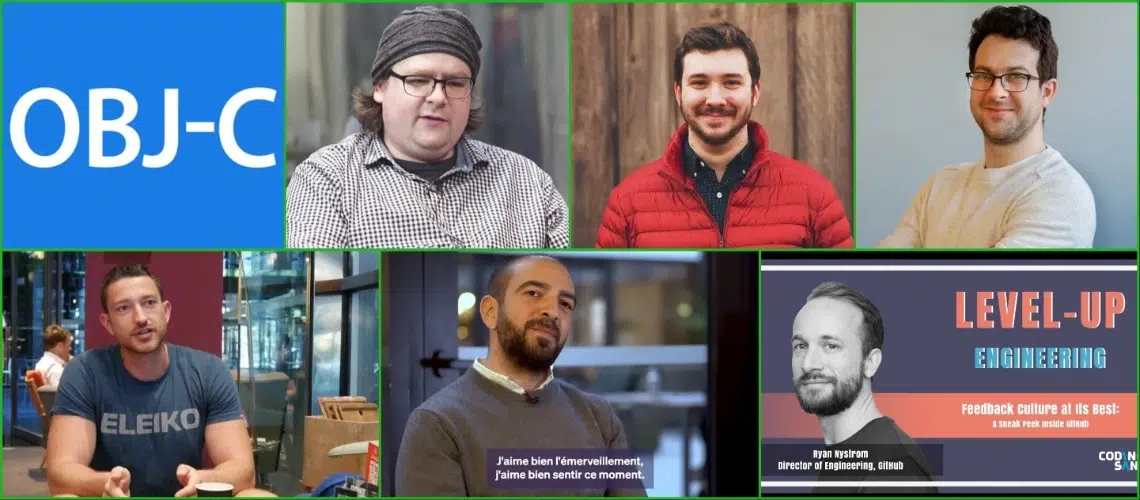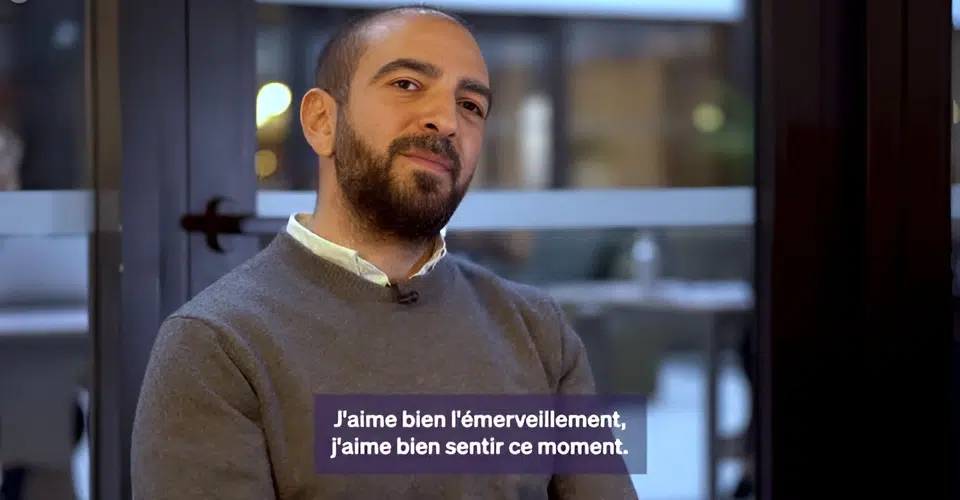16 Elite Objective-C Developers

Objective-C may no longer be Apple’s newest language, but it’s still core to countless apps. The developers below stand out for their ongoing impact – whether through open-source contributions, startup leadership, community building, or key roles at major tech firms.
Here are top Objective-C developers globally, recognised for their code, influence, and commitment to the Apple ecosystem.
- Ryan Nystrom
- Mattt Thompson
- Jesse Squires
- Olivier Poitrey
- Justin Spahr-Summers
- Mike Ash
- Peter Steinberger
- Brad Larson
- Max Howell
- Nick Lockwood
- Sam Soffes
- Wei “OneVcat” Wang
- Saul Mora
- Ash Furrow
- George Nachman
- Jeff Verkoeyen
Now, let’s delve into each of these individuals’ contributions and why they are notable in the Objective-C world:
Ryan Nystrom

Nationality: American
Ryan is a young dev who rapidly ascended to prominence through impactful open-source and leadership at major tech companies.
While at Instagram (Facebook), Ryan spearheaded the development of IGListKit, an Objective-C/Swift framework for building fast, diffable list UIs on iOS. IGListKit was open-sourced and became a hit with iOS developers, showcasing advanced techniques to optimize UICollectionView. In Instagram’s engineering blog, Ryan was highlighted as a key iOS infrastructure engineer driving that project. Earlier in his career, Ryan also contributed to Snapchat’s iOS app and built smaller libs like CNMatter (color parsing).
After IGListKit’s success, Ryan moved to GitHub where he led the team that built GitHub for mobile. In doing so, he brought along his love for open-source – the GitHub iOS app is heavily informed by lessons from IGListKit, and he even discussed its development on podcasts. Ryan is active on Twitter and the Swift forums, often mentoring others on building efficient UIs. As an Objective-C expert, he demonstrated how to blend old and new: writing performance-critical components in Obj-C for a mostly Swift codebase. He continues to maintain IGListKit and engage with the community.
Ryan’s mix of open-source innovation and real-world app leadership (Instagram and GitHub, both at massive scale) firmly places him among the top Objective-C devs.
- Linkedin: Ryan Nystrom
- X (Twitter): @_ryannystrom
- Github: rnystrom
Mattt Thompson
Objective-C forces you to think differently. It’s not just syntax, it’s a mindset about how you communicate with objects.
Nationality: American
Mattt is a developer renowned for his open-source work and writing in the Objective-C community.
He is the creator and maintainer of AFNetworking, which for years was the de facto networking library for iOS. Mattt also launched NSHipster, a popular blog (and later book) about “obscure topics” in Cocoa and Objective-C that became a must-read for iOS/macOS developers. In addition to AFNetworking, he built tools like Postgres.app and Helios, demonstrating a broad range of expertise.
Previously the mobile lead at Heroku and an iOS developer at Gowalla, Mattt has spoken at conferences worldwide on Objective-C, Ruby, and more. In recent years he joined Apple (as indicated by community chatter) and has been less visible in open source, but his past contributions continue to influence developers.
His work exemplifies bridging practical coding with developer education, cementing his status as an Objective-C authority.
Jesse Squires
Nationality: American
Jesse is an influential iOS developer who has worn many hats: open-source maintainer, blogger, podcaster, and Apple engineer.
He is perhaps best known for creating JSQMessagesViewController, an Objective-C UI library that provided a plug-and-play messaging interface (chat bubbles, etc.) for iOS apps. At its peak, this project amassed over 11,000 stars on GitHub and was used in over 50,000 apps – including early versions of Signal Messenger. This achievement alone made Jesse a recognized name among iOS devs (the library filled a big need before Apple’s own Messages UI was customizable).
Jesse also co-authored IGListKit (in Swift) while at Instagram, working on scalable UICollectionView infrastructure. Beyond coding, he’s a writer – his personal blog often discusses Swift, Objective-C, and development culture – and he co-hosted the Swift Unwrapped podcast. He even ran the “Swift Weekly Brief” newsletter for years. Now an independent consultant, Jesse continues to contribute to open source (recently focusing on Swift packages) and shares knowledge.
His blend of hands-on coding (with Obj-C roots) and community building makes him stand out as one of the top Apple platform developers.
- Linkedin: Jesse Squires
- X (Twitter): @jesse_squires
- Github: jessesquires
- Website/Blog: jessesquires.com
Olivier Poitrey

Nationality: French
Olivier is a French engineer and entrepreneur who straddles the worlds of open source and large-scale tech leadership.
He co-founded the video platform Dailymotion and served as its Technical Director (CTO) until 2015. In the iOS development realm, Olivier is best known as the original author of SDWebImage, an immensely popular Objective-C library for asynchronous image loading and caching. Many apps have relied on SDWebImage to efficiently handle remote images.
Today, Olivier is the Director of Engineering for Core Streaming at Netflix, where he applies his expertise in networking and media delivery. He also co-founded NextDNS, a privacy-focused DNS service.
Despite his senior roles, Olivier remains a “geek, coder, maker” at heart. His continued support of open-source and his deep Objective-C roots make him a standout in this list.
- Linkedin: Olivier Poitrey
- X (Twitter): @Olivier_Poitrey
- Github: rs
Justin Spahr-Summers
Nationality: American
Justin is a powerhouse in the Objective-C open-source world, best known for his work on ReactiveCocoa, Mantle, and Carthage.
While at GitHub, Justin co-created ReactiveCocoa, an influential framework that introduced functional reactive programming paradigms to Objective-C developers. He also authored Mantle, a model framework for Cocoa used to easily manage JSON and model objects. Later, Justin created Carthage, a lightweight dependency manager for Obj-C/Swift projects that offered an alternative to CocoaPods.
Justin’s breadth of contributions – from low-level runtime extensions to developer tools – is remarkable. He eventually moved to Facebook’s London office to work on developer infrastructure (and continued to support open-source there). Justin is also known for advocating code quality and correctness.
By pushing Objective-C in new directions, Justin has helped modernize Cocoa development and earned deep respect in the community.
- Linkedin: Justin Spahr-Summers
- X (Twitter): @jspahrsummers
- Github: jspahrsummers
Mike Ash
Nationality: American
Mike is often regarded as the go-to expert for low-level Mac and Objective-C programming insights.
He gained fame through his “Friday Q&A” blog series on MikeAsh.com, where for years he dissected complex topics such as the Objective-C runtime, assembly optimizations, and memory management. This blog was later compiled into The Complete Friday Q&A book, which a reviewer described as “consistently one of the most interesting and informative writings on Obj-C development”. Many advanced Obj-C developers credit Mike’s articles for helping them truly understand the inner workings of the language and Cocoa frameworks.
Professionally, Mike has worked across the spectrum – from indie Mac apps to, more recently, a stint at Apple (where he contributed to Swift and runtime development). In the community, he also wrote libraries like MAObjCRuntime and even dabbled in things like a Lisp interpreter for Cocoa. His willingness to share knowledge in an accessible way (sprinkled with humor) set him apart.
Mike’s contributions might not be a single famous app or framework, but rather an entire body of educational content and open-source snippets that have upleveled the skill of countless Objective-C programmers. He’s truly a mentor figure in this space.
Peter Steinberger

Nationality: Austrian
Peter is the founder and CTO of PSPDFKit, a successful tech company known for its PDF and document framework on iOS.
A Vienna-based developer, Peter started PSPDFKit in Objective-C back in 2011, and it has since grown into a comprehensive SDK used by banks, governments, and enterprises to handle PDFs in their apps. Beyond running a company, Peter has personally contributed many helpful open-source projects over the years. For example, he created PSPDFTextView and PSPDFToolbar, and an Xcode plugin for managing image assets. He’s also known for his work on Apple’s developer forums and open-sourcing bits of PSPDFKit’s underpinnings where possible.
Within the community, Peter (often under the handle “steipete”) is respected as both an engineer and an entrepreneur. He balances writing code (he tweets about debugging UIKit quirks in Obj-C) with leading a 50+ person dev team. He was listed among top Objective-C devs on GitHub by followers, and he frequently speaks at conferences like WWDC and UIKonf. Peter’s influence also comes from advocating best practices – he’s written about writing clean, reusable code in Cocoa.
By building one of the premier third-party frameworks in Objective-C and still actively engaging with developers, Peter Steinberger solidly earns his spot here.
- Linkedin: Peter Steinberger
- X (Twitter): @steipete
- Github: steipete
- Website/Blog: steipete.me
Brad Larson
Nationality: American
Brad is a scientist-turned-software developer who brought high-performance image processing to iOS devs.
He is the author of GPUImage, an open-source framework that allows real-time GPU-accelerated filters and effects on images and video in iOS apps. When Brad released GPUImage in 2012, it was revolutionary for enabling complex image operations at interactive speeds on iPhones, and it quickly gained tens of thousands of stars on GitHub. He has since also worked on GPUImage 2 and 3 (rewritten in Swift/Metal), keeping the project evolving.
With a background in physics, Brad co-founded a technology company (Sonoplot) before focusing on Apple platforms. His ability to straddle academic rigor and practical coding is evident – for example, he has used iPads for scientific data visualization and even won Apple’s WWDC scholarships in the past.
Brad recently joined a machine learning startup (Modular AI) as a Product Manager, but he remains active in the coding community, often sharing insights on Mastodon about graphics and GPU computing.
- Linkedin: Brad Larson
- Github: BradLarson
Max Howell

Nationality: British
Max is best known as the creator of Homebrew, the wildly popular macOS package manager – though Homebrew is more Ruby than Objective-C, it established Max as a star in the Apple developer ecosystem.
Transitioning from that success, Max also dabbled in Objective-C and iOS: he created PromiseKit, a well-regarded async programming library that brought JavaScript-like promises to Obj-C (and later Swift). PromiseKit made asynchronous code more manageable for countless developers. Max has also contributed to OS X open source projects and was an early advocate of integrating open-source tools with Apple’s platforms.
Famously, Max once tweeted about failing a Google interview where he was asked to invert a binary tree – a story that went viral and highlighted that his real-world impact (Homebrew) far outweighed parlor trick questions. In recent years, Max founded a company to build a new programming language (“Tea”), showing his continuous drive for innovation. He appears on the GitHub Objective-C top dev list by followers, and is active on Twitter sharing thoughts on software design.
Max’s journey—from building essential developer tools that underpin many Objective-C developers’ workflows, to pushing new frontiers—earns him recognition among the best.
- Linkedin: Max Howell
- X (Twitter): @mxcl
- Github: mxcl
- Website/Blog: mxcl.dev
Nick Lockwood
Nationality: British
Nick is a U.K.-based developer known for an array of popular Objective-C libraries and contributions.
He created iCarousel, a versatile 3D carousel/cover-flow UI component for iOS and macOS that many apps adopted (this project itself has over 12k stars on GitHub). Nick didn’t stop there – he also wrote frameworks like FXForms (form generation), FXLayout, SwipeView, and more, essentially building a toolkit that extended UIKit’s capabilities. His open-source contributions have been so extensive that he was once ranked the #3 Objective-C developer on GitHub globally by followers.
In addition to coding, Nick authored the book “iOS Core Animation: Advanced Techniques” – sharing his deep knowledge of graphics and animations. He has been active in the community for over a decade, including answering questions on Stack Overflow and speaking at conferences. Nick’s professional work spans his own company Charcoal Design and time at larger companies (he was at Facebook London for a while, working on iOS infrastructure).
Even as Swift rises, Nick continues to maintain his Obj-C libraries for compatibility. His combination of practical open-source code and willingness to teach makes him a pillar of the Objective-C developer scene.
- Linkedin: Nick Lockwood
- Github: nicklockwood
Sam Soffes

Nationality: American
Sam is an American iOS developer who made a name through both his coding projects and his design sense.
In the Objective-C days, Sam built SSToolkit, a collection of useful UI components and utilities that many developers integrated into their apps. He also created the early note-taking app Shares, and was one of the first to open-source sizable portions of an iOS app’s code for learning purposes. Sam’s open-source reputation led him to roles at startups like Hipstamatic and Venmo (he was an iOS engineer at Venmo). At Venmo, he continued to contribute to OSS (like DVIAudioUnit for audio).
Sam also ran a popular blog at soff.es where he transparently wrote about development and even his income from indie apps – gaining a large following for his candor. He’s active on Stack Overflow and Twitter, often sharing tips or mocking up interface ideas. In recent years, Sam worked at Github on mobile (and now at Oracle). While he’s moved largely to Swift, he maintains some Objective-C projects for compatibility.
As an indie founder, open-source contributor, and blogger, Sam exemplifies the well-rounded developer who elevates the community. It’s no surprise he ranks highly among Obj-C devs by followers, given his long-standing contributions.
- Linkedin: Sam Soffes
- X (Twitter): @soffes
- Github: soffes
- Website/Blog: soff.es
Wei “OneVcat” Wang
Nationality: Chinese
Wei, better known by his online alias OneVcat, is a prominent developer and author bridging the Chinese and global iOS communities.
Originally from China but working in Japan for LINE Corp., Wei gained international acclaim for creating VVDocumenter, an Objective-C plugin for Xcode that automated the generation of documentation comments. This tool became a must-have for many Obj-C devs seeking to document their code, and showcased Wei’s ability to augment Apple’s tools. He’s also the author of “Swifter: 100 Swift Tips”, a best-selling book (in Chinese and English) that helped many developers transition from Objective-C to Swift with practical recipes.
Wei has contributed to various open-source projects (like improving cocos2d-x, a game engine) and writes a popular technical blog at onevcat.com. His work exemplifies polyglot proficiency: even as he teaches Swift now, his roots in Objective-C (and continued maintenance of older libraries) remain strong. Wei is also active on forums helping others (often answering in both English and Chinese).
By pushing tooling (like VVDocumenter) and sharing knowledge across language barriers, Wei “OneVcat” Wang has earned respect as one of the best Objective-C developers globally.
Saul Mora
Nationality: American
Saul is often introduced as “Mr. Core Data” in the iOS world.
He created MagicalRecord, an Objective-C library that dramatically simplified using Apple’s Core Data framework by providing a convenient, Ruby-on-Rails-inspired syntax for common database operations. MagicalRecord saved developers from writing boilerplate Core Data code and became the go-to solution for Core Data stacking, fetching, and threading issues for many years. Saul’s tagline for it – “Core Data, without the headache” – resonated with the community, and MagicalRecord remains widely referenced.
Beyond that, Saul was the host of NSBrief, one of the first Cocoa developer podcasts, where he interviewed many notable Mac/iOS developers (thus indirectly enriching the community). He contributed to the Cocoa Is My Girlfriend blog and has spoken at countless meetups and conferences about Core Data and testing. Professionally, Saul worked at companies like Fitbit and Disney on their iOS teams, and more recently as an engineering manager, but he still codes and maintains his open-source.
His dedication to improving a specific corner of Objective-C development (persistent storage) and engaging with the community through media has made Saul a beloved figure among Objective-C developers.
- X (Twitter): @casademora
- Github: casademora
Ash Furrow

Nationality: Canadian
Ash is a Canadian developer and author known for combining technical skill with empathy and arts.
During the height of Objective-C, Ash wrote “Your First iOS Application” and the seminal “Functional Reactive Programming on iOS” book, helping to introduce concepts like ReactiveCocoa (to which he contributed) to a wider audience. At Artsy, Ash was a lead iOS engineer and open-source champion: he helped open-source Artsy’s app and wrote about their modular architecture, which influenced many startups. Ash also created smaller libraries like AFNetworking-RACExtensions (bridging AFNetworking to ReactiveCocoa) and was active in the Core Animation and Swift communities.
Ash’s blog is personal and insightful, covering topics from SwiftUI to mental health in engineering. He has spoken about “compassionate software development”, emphasizing teamwork and inclusion alongside code. In Objective-C circles, he’s remembered for pushing forward ReactiveCocoa patterns and for co-hosting the Swift Unwrapped podcast in early Swift days. After Artsy, Ash joined Shopify where he continued to work on mobile tooling (and most recently Unity tooling).
Ash’s well-rounded contributions – technical writing, open-source, community building, and a focus on improving developer culture – make him a unique and valuable member of the Apple developer community.
- Linkedin: Ash Furrow
- X (Twitter): @ashfurrow
- Github: ashfurrow
- Website/Blog: ashfurrow.com
George Nachman
Nationality: American
George is the creator of iTerm2, the most popular replacement for the macOS Terminal app.
iTerm2 is a complex Cocoa application written largely in Objective-C (with some C/C++), and it provides a plethora of features (split panes, search, autocomplete, profiles) that have made it indispensable for developers and power users on Mac. George started iTerm2 as a labor of love (famously as his “20% project” while working at Google), and it has grown to millions of users worldwide. The project’s success is a testament to George’s skill in systems programming and UX design within Objective-C – handling Unix pty interactions, drawing text grids efficiently, etc., all with native Cocoa performance.
George worked on Google’s Chrome and Search apps for iOS as well, giving him experience with large-scale Objective-C projects in a corporate setting. Eventually, he left Google to focus on iTerm2 and related dev tools full-time. He continues to actively maintain iTerm2 (which is open-source on GitHub) and engage with its user community. In an era where many Mac apps have moved to Swift, iTerm2 remains a shining example of a robust Objective-C application continually evolving.
For creating a tool that so many developers rely on daily, and maintaining its quality over a decade, George Nachman is rightly celebrated as a top Objective-C developer.
- Linkedin: George Nachman
- X (Twitter): @gnachman
- Github: gnachman
Jeff Verkoeyen
Nationality: Canadian
Jeff is best known for building Nimbus, an Objective-C iOS framework designed around highly documented, modular components. Nimbus positioned itself as a practical successor to the earlier Three20 era, with a focus on reusable UI pieces and clear guidance for teams shipping large apps. The project remains available on GitHub and via CocoaPods, and it is still maintained in a limited, best-effort mode.
Beyond open source, Jeff has been closely associated with high-profile iOS work, including being described in the press as the developer who built Facebook’s iPad app. He has also written publicly about Nimbus internals and UI engineering tradeoffs, which made his work useful beyond a single codebase.
- Linkedin: Jeff Verkoeyen
- Github: jverkoey
- Website/Blog: jeffverkoeyen.com
Wrap Up
These experts represent exceptional talent, making them extremely challenging to headhunt. However, there are thousands of other highly skilled IT professionals available to hire with our help. Contact us, and we will be happy to discuss your hiring needs.
Note: We’ve dedicated significant time and effort to creating and verifying this curated list of top talent. However, if you believe a correction or addition is needed, feel free to reach out. We’ll gladly review and update the page.
Frequently Asked Questions
Objective-C is not dead, but it is no longer the primary language for iOS and macOS development. Apple has shifted to Swift, though Objective-C is still maintained and widely used in legacy apps and large enterprise codebases.
In the United States, Objective-C developers typically earn $90,000 to $130,000 per year. Hourly contract rates range from $45 to $90 depending on experience and project scope. Rates in Eastern Europe and Latin America are generally lower.
Subject matter experts in Objective-C are usually senior iOS or macOS developers with extensive experience maintaining and modernizing legacy apps. Many also have Swift knowledge for bridging old and new codebases.
You can find Objective-C developers through IT staffing firms, freelance platforms such as Toptal and Upwork, or specialized iOS development agencies. Targeting developers with both Objective-C and Swift experience ensures long-term maintainability.
Freelance platforms like Upwork, Freelancer, and Fiverr list Objective-C specialists. For enterprise projects, Toptal and Clutch-listed agencies are effective options.
